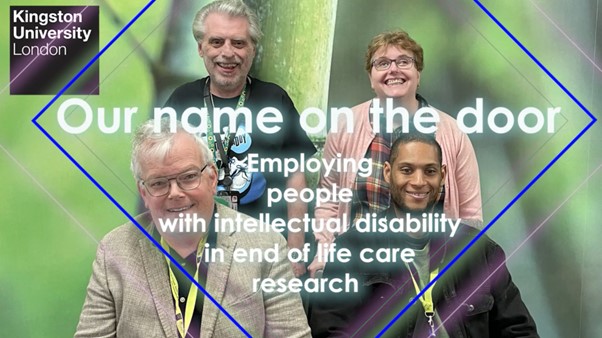
A couple of months ago, one of my colleagues spotted that there was an “Employer of People with a Disability” category at the National Learning Disabilities and Autism Awards. How about nominating Kingston University?
YES! said Richard. We’ll nominate you! He sat down with Tasha, one of our team members employed specifically to support him in his researcher job, and told her what to write. They also added some of the contributions of his other colleagues. This is what they sent in:
OUR NAME IS ON THE DOOR, NEXT TO THE PROFESSOR’S NAME!
We are 4 researchers with a learning disability. Kingston University has employed us as proper members of the learning disability research team. They made it possible for us. They ran a research course. The application form was in Easy Read. Even our appraisals are in Easy Read. They employ support researchers to help us. They help us book taxis to get to work.
RICHARD: “We have the learning disability, we live it, we’re the experts. We’re more than just a pat on the back and we bring so much to this job. Working here makes me feel good about myself wearing smart clothes, going off to do a day’s work, getting paid for it. I feel valued. I can now shop in places I never used to be able to. This job has opened doors for me. I get to meet different people like professors and training the nurses of the future. I feel part of society.”
LEON: “I didn’t know you could be a university researcher, so I’m really surprised and pleased. It’s a warm, relaxed, friendly atmosphere. At lunchtime we all sit together, as equals, sharing our news.”
AMANDA: “We can do anything we want to do in our lives if we have the right support. But not everybody will think of employing someone with a learning disability. Now other universities can see, LOOK! These people can work together as a team. Why can’t WE employ someone with a learning disability?”
Only 5% of people with a learning disability have paid work. Kingston University is a trail blazer by employing us. What we really like here is that people look up to us, not down at us. They treat us with respect. We feel proud working here.
We were shortlisted. I was interviewed on Zoom. Thankfully, Richard and Amanda were in the office that day, so they could help me out – and they did. The judges said they were moved to tears by what they said, and by the short video we showed them.
Tears are promising, we thought. Might we win? But then again, there were 11 other organisations nominated in our category.
In any case, a good enough excuse to travel up to Birmingham with the entire team (except the three colleagues who couldn’t make it – one was at a conference in Australia, one was at home with her newborn baby, and one – David, one of our KEY researchers – was sadly unwell in Awards Week and missed out).
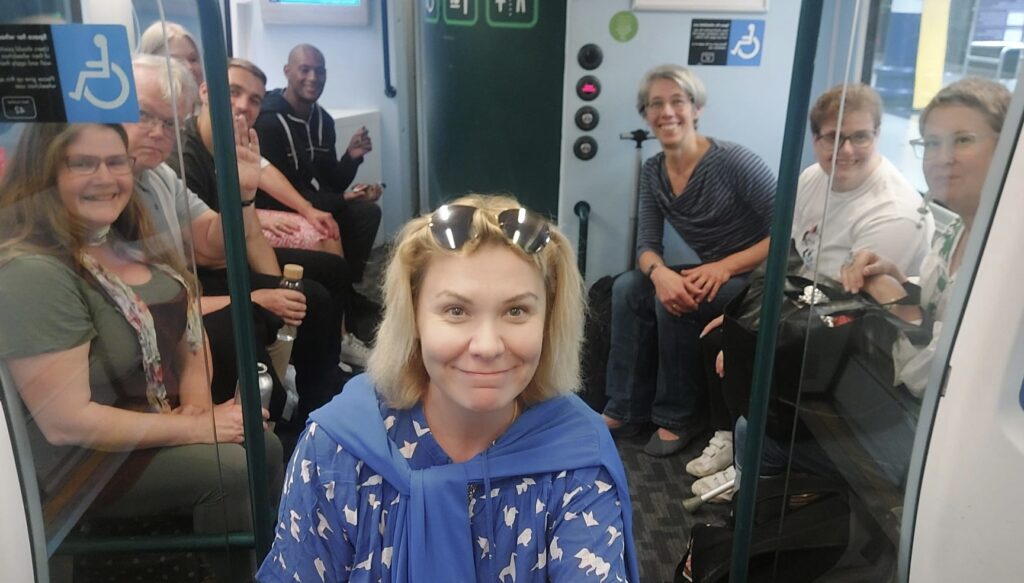
A gala dinner. The best way to explain what to expect was Imagine the Oscars. We talked about outfits. Several colleagues headed for the shops. For some, a black tie event was a lifetime first for which their existing wardrobe was unprepared.
How did you feel in the Posh-Section-Of-The-Shop? I asked. Like a VIP, was the answer of someone who still couldn’t quite believe that “VIP” and “me” belong in the same sentence.
The trip was worth it for this experience alone. Shouldn’t we all have moments when we feel like a Very Important Person? Because we are. We all are. So here is our group of 10 VIPs at our hotel just before the event, gasping at seeing each other all dressed up and ready to roll.
We felt like film stars… James Bond was invoked.
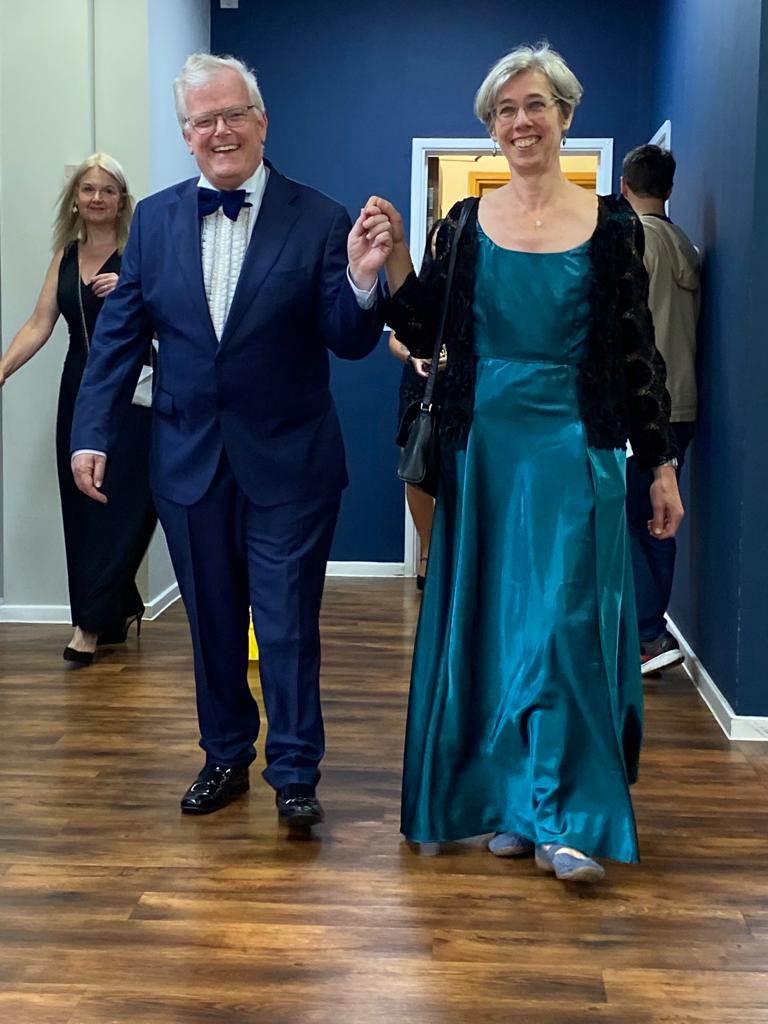
So, we had a great time. There was definitely GALA in the dinner, the stage was set, the music was ear-splitting, the food was fancy and spirits were high. And when KINGSTON UNIVERSITY was announced as winner, the cheers were loud.
I was a bit concerned about accessibility – for Disability & Autism awards, the event was remarkably autism-unfriendly, with its loud music and flashy lights; and the only way to the stage was with steps. I beckoned the presenter to come down, but Amanda was determined – nobody was going to stop her from going up. More confident of winning than I was, she had already rehearsed a speech. She took hold of the microphone, leaving the presenter with no option but to wave to the control room to turn the music down.
“I want to thank Kingston University for employing people with a learning disability. WE CAN BE RESEARCHERS!”
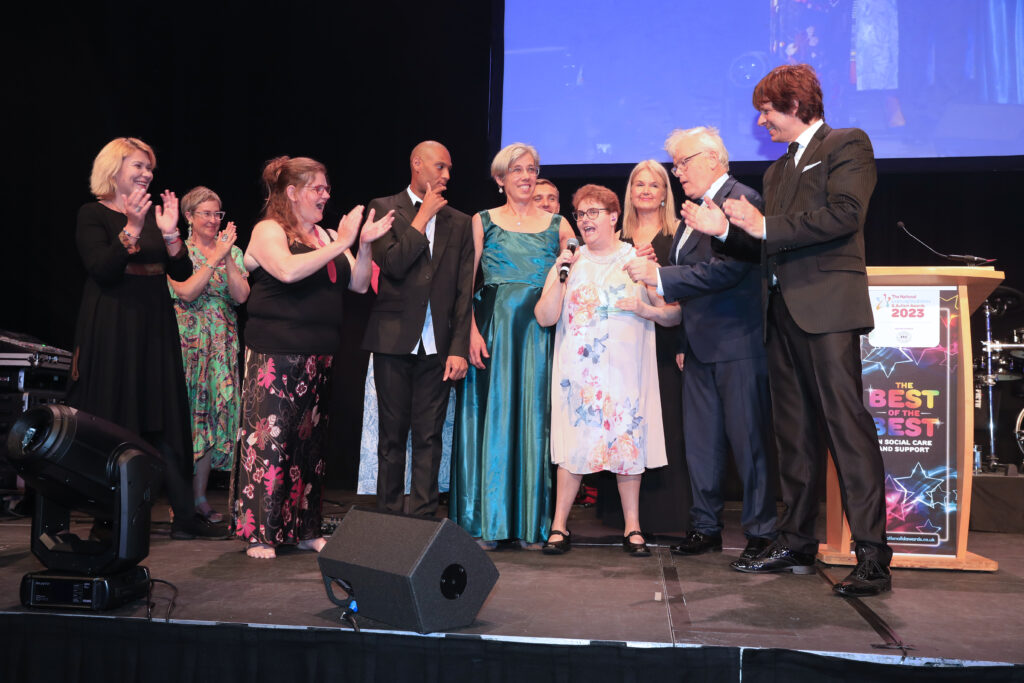
If that wasn’t enough to make everyone sit up, Richard then asked for the microphone and gave us one of the most memorable moments of the evening.
“Two weeks ago, my Dad died. He would have been so proud to see me standing here. When I was born, he was told that I would never do anything. And here I am now.”
I couldn’t be prouder of my amazing and utterly diverse team of researchers. It is just so very obvious that I need ALL of them. Going up to collect this award without my disabled colleagues would have been ridiculous.
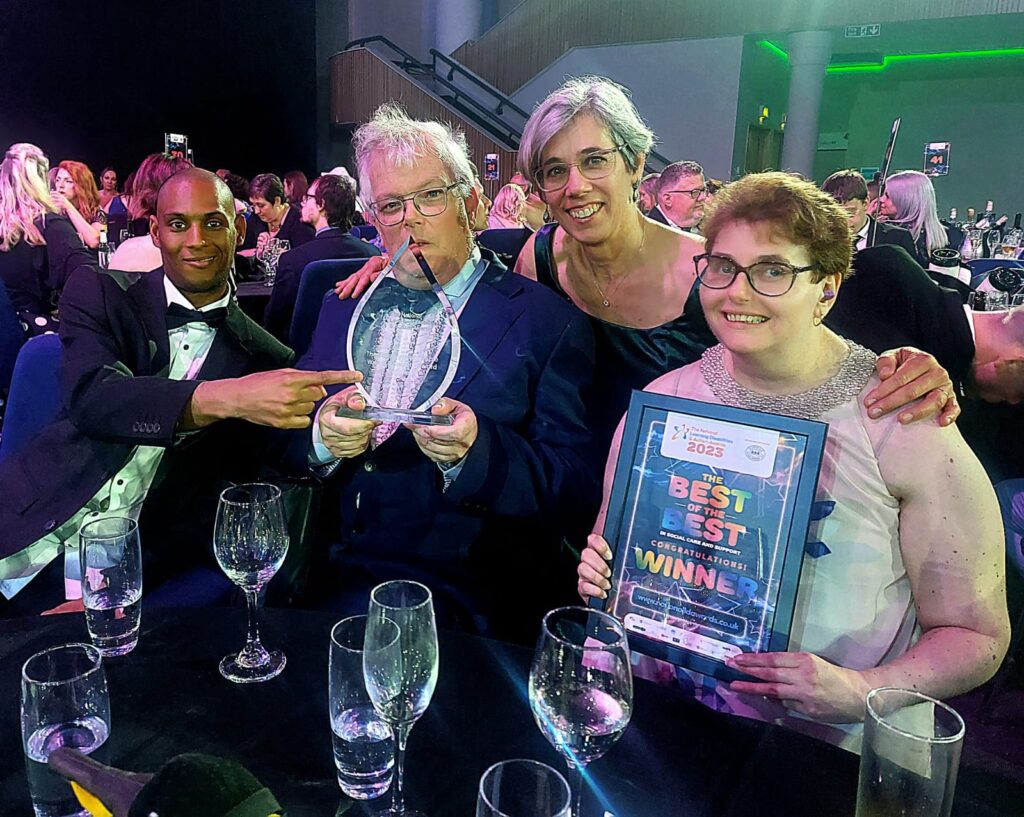
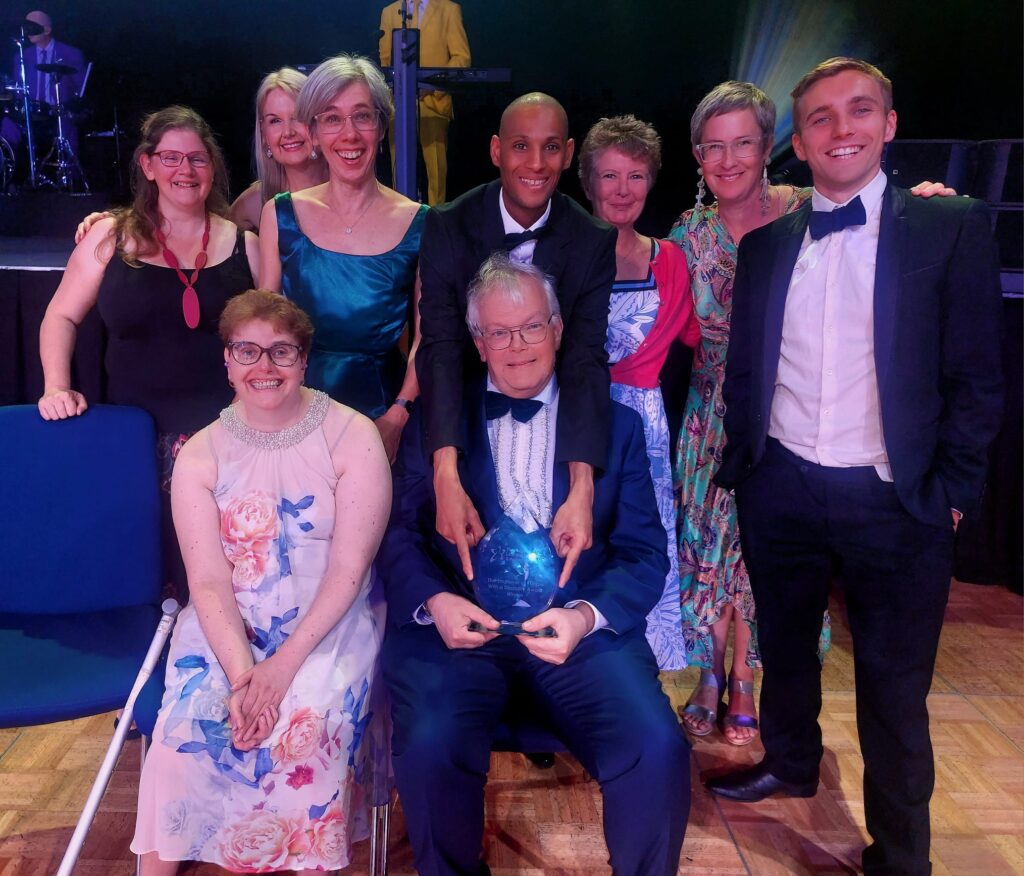
Getting to this point has taken years of hard work, through setting up the GRASSroots group, through involving people as advisors in end-of-life projects, through writing papers together, through preparing potential researchers with learning disabilities with a training course, through working around the employment red tape courtesy of a willing HR team, and through time-consuming processes of finding funding not only for the disabled researchers, but also for the support researchers needed to enable them to contribute to their fullest. The time and resources needed to do this kind of inclusive research cannot be under-estimated. But oh, it is worth it.
It isn’t all plain sailing. Research work is precarious and dependent on finding funders interested enough to invest in our Cinderella topics. (Death. Learning disability.) Few researchers are on permanent contracts. In my team of 11 people, I am the only employee with a permanent position – everyone else is dependent on external research grant funding, with their jobs ending when their project ends, unless I find new project grants – not easy when I’m busy running my current projects.
So, my hope is that Richard, Amanda, Leon and David are able to show how indispensable they are, not only as part of our research team but also as trainers of future generations of health and social care staff. Perhaps it’s time to offer people with a learning disability a permanent position, not just at learning disability research faculties but also at university schools of nursing/social work/etc.
If TEAM BUILDING was part of the reason for getting all of us to Birmingham (quite a feat of organisation, let alone the expense – Gala Dinners come at a cost that won’t be easy for nominees on low budgets, so THANK YOU to the Kingston School of Nursing for funding our table), then it’s Mission Accomplished. But it has also done something else – something rather unexpected, given that these were the LEARNING DISABILITY & AUTISM awards: It has made my colleagues think about the true meaning of inclusivity. They looked around and wondered: WHY aren’t there more people with a learning disability here? Why is the stage so inaccessible?
Why, after we were applauded on stage, did someone come up to Amanda and indulgently stroke her face, as if she was a pet rather than a person? I was too taken aback to say anything, but it made me remember all the other moments I have been with Amanda when strangers have stroked her hair or touched her face unexpectedly and without asking. So let me ask you: Have YOU ever been petted by a complete stranger? No? Thought so. Me neither. (Perhaps people with disabilities need their own #MeToo movement.)
Perhaps this is a low note to end on… We really are delighted with our win, but we are also aware that we all still have a long way to travel. In the meantime, hats off to Kingston University for supporting us in thinking outside the box and cutting the red tape that enabled me to employ people with a learning disability as full (and fully paid) members of my team.
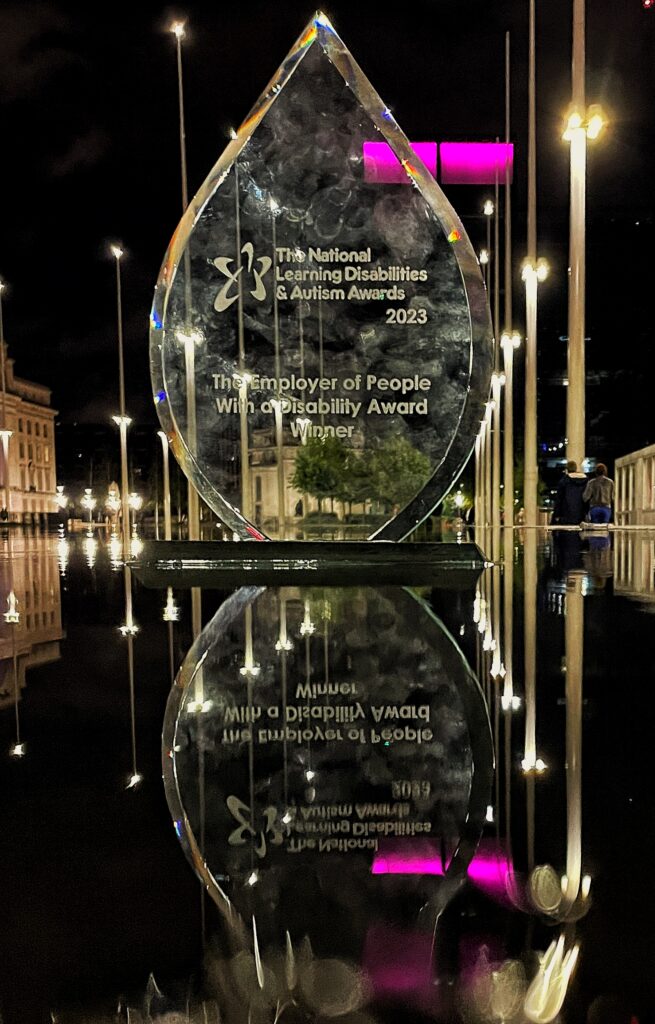

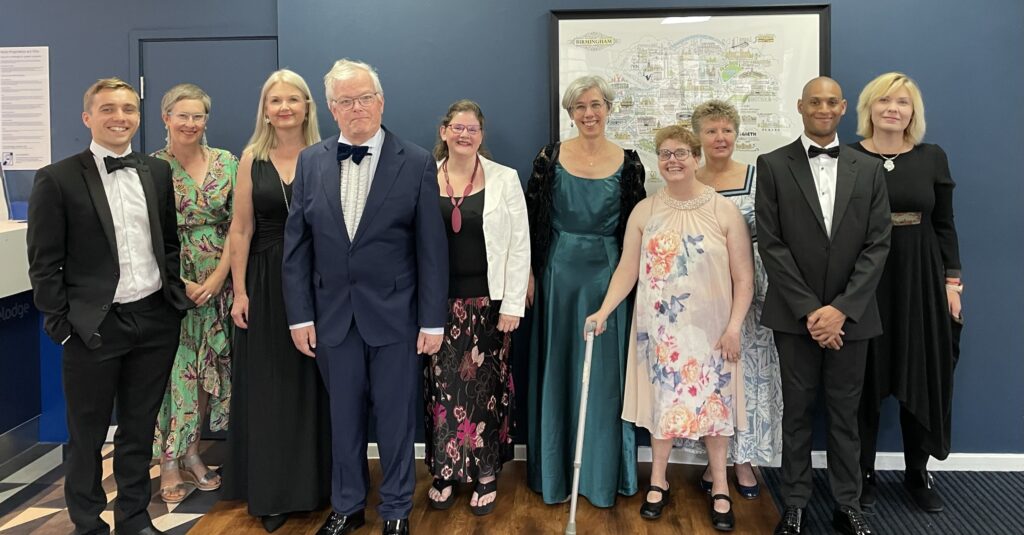
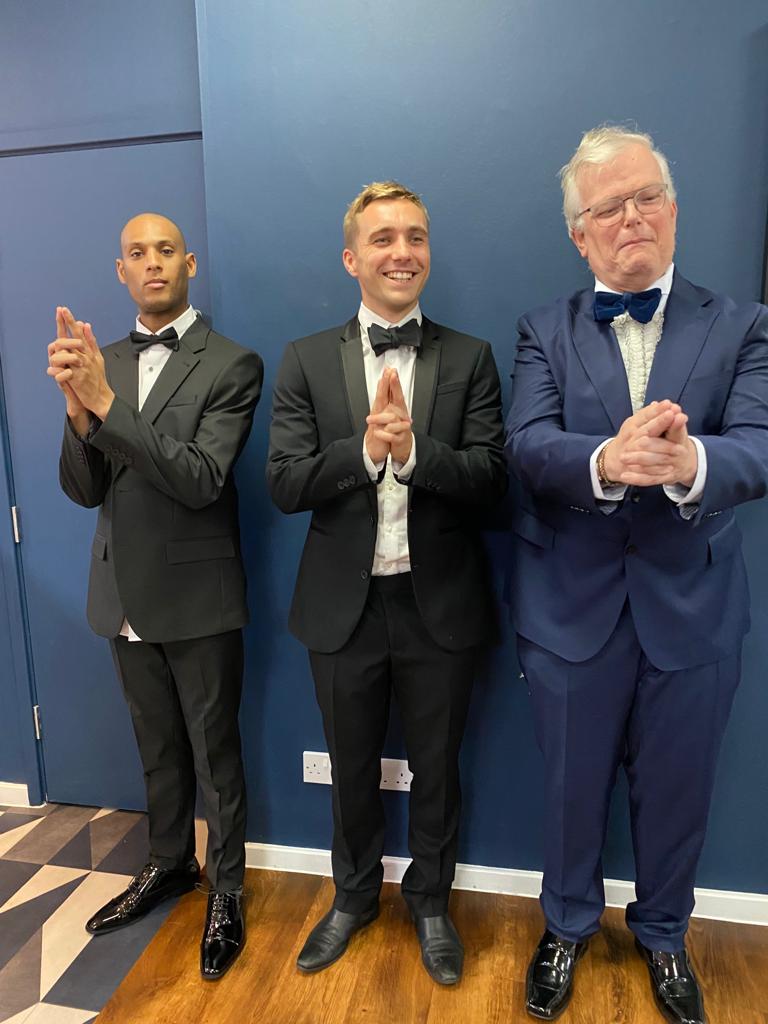
Beautifully said!
Beautiful!